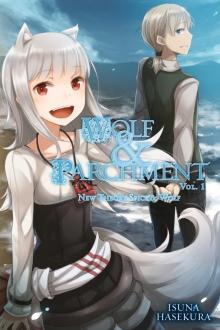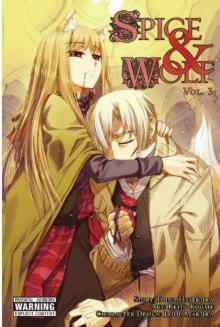- Home
- Isuna Hasekura
Wolf & Parchment, Volume 2 Page 6
Wolf & Parchment, Volume 2 Read online
Page 6
“Please take a seat by the furnace. I’ll bring you some drinks.”
The merchant motioned toward something resting squarely in the atrium’s center that could only be termed a furnace. It was metallic and stout, with a chimney extending up and out of the ceiling. From its wooden mouth, Col caught a glimpse of what seemed like an unreliable flame.
“They get their firewood from the sea…”
Sitting by the hearth was the kind of driftwood they saw on the beach. Myuri had perhaps imagined someone hunched over and shivering, gathering firewood under leaden skies on a beach beaten by icy waves. Collecting such firewood seemed like hard labor, almost like it was some sort of punishment.
“We finally have fire. Let’s go ahead and place our things by it.”
It was completely silent in the trading house, as though not a soul was present. Though they placed their things by the fire, they kept their coats on. Even with a roof and walls surrounding them to shelter them from the wind, it felt just as cold as it did outside.
Col went to grab chairs from a nearby table, but when he touched them, they were oddly soft from the salt and humidity. He was not sure whether the room was finished or not, but because of how wide it was, the shadows in the room grew darker even before the sun had set—it was depressing, perhaps even more so for a girl who had come from a lively hot spring village.
He considered this and turned to Myuri, who was holding driftwood that she never saw in Nyohhira and was studying it.
“Myuri?” he called to her, and when she looked at him, her eyes were shining.
“It’s like an inn at the edge of the world. It’s so exciting!”
“…”
Though she had been throwing up and her face was a bit pale, her spirit was recovering quickly.
Myuri’s youth and the ability to find enjoyment from anything she found in front of her warmed Col more than the furnace did.
“I didn’t think we’d be getting guests today, so I apologize for the appearance.”
As they were doing all that, the merchant who came out to greet them brought over steaming tin cups. They took them, and inside was a mixture of goat’s milk and honey. Perhaps the drink was a staple in these parts. He imagined that goat’s milk after throwing up would not be very good for Myuri and looked at her, but she sniffled from the steam and eagerly drank it.
“It’s quite a large building, but is it typically livelier than this?”
“Yes. The winter fishing season is over for now. This hall was filled with barrels of herring for sale to merchants and couriers who were sleeping in every cranny, leaving no room for anything else. Every day, commercial ships were arriving at all hours. What a riot it was.”
Despite what the merchant described, the atrium did not particularly smell of fish. His story sounded almost like he was reminiscing about a castle that was lively once upon a time but long since destroyed by war.
“And it will be filled again with migrant workers in the coming seasons; only this time, it’ll be those eyeing the spring storms.”
Col sipped his helping of goat’s milk. It was sweet enough to melt his teeth away, but perhaps it was just what he needed in such a cold and dark place.
“For the storms?”
“We say storms, but we really mean the things that get washed up by them. We sometimes get sea creatures with horns or even giant sturgeons washing ashore. All sorts of things.”
Myuri’s eyes went blank when she heard “sea creatures with horns.” It sounded mythical, and it seemed she had thought it was made up.
But Col had seen them before in real life. The animal’s horns were sometimes said to hold the power of granting immortality and traded as snake oil. The sea was truly full of more mysteries than land could ever be.
“Also amber. A mess of it washes ashore after the storms.”
When the conversation turned to easily understandable gems, Myuri’s eyes sparkled.
“You can gather even the smallest bits on the beach, but the largest pieces are deep in the sea. That’s why they make large sieves in town, then pack them on boats to ship here. Greedy folks bring ones so big they can’t carry it alone. Then they head out to all these different islands and wait for the big storms to come. When the time is right, they go out in the raging wind and waves, wade out waist-deep into stinging water, then search along the floor underwater. To make sure they don’t faint from the cold and drift away in the water, they tie ropes to one another. Even then, it’s never-ending, dangerous work.”
It was terrifying just imagining it, the very thought giving Col a chill.
But Myuri was so enraptured by the story to the point she barely noticed snot creeping down from her nose.
“That goes on until the flowers on the bare hills behind us begin to bloom. All these folks hoping to get rich quick come flooding in. It’s amazing how lively it gets. Sometimes there are amazing individuals who have earned their entire fortune with a single pull. And in the summer, this island becomes a base for people gathering peat and coal or mining iron ore. Well, that business has been in a slump recently…But still, what I mean to say is, you two arrived at a very rare moment of quiet.”
The merchant smiled merrily.
“So, the cargo on the ship we traveled on is meant to prepare for what’s coming?”
“Yes, I think so. Or it could be for islands even farther north of here. The Debau ship isn’t due for a few days still, so my buddy and I have just been relaxing.”
The merchant smiled and pointed with this thumb to a room connected to the atrium, where a dog sat, peering over at them with an air of intelligence.
“He’s usually friendlier, but maybe he’s being a little nervous around God.”
Col of course did not mention that he guessed it was due to the blood of wolves in Myuri’s veins.
“But still, I guess there’s a reason you’ve gone as far as hitching a ride on another company’s ship?”
The merchant spoke calmly as he added a piece of driftwood, white and smooth as a deer’s antlers, to the furnace.
As Myuri drank the goat’s milk, her eyes were trained on Col.
Her cheeky gaze seemed to say, “Are you going to do it?”
“And both of you are quite young.”
As he tended the fire, he glanced back at them over his shoulder with a very merchantlike, openly scrutinizing look.
That being said, both of them were already quite aware that together they drew unnecessary attention. Col straightened his posture, placed his hand on his breast, and dropped into a bow.
“My name is Tote Col. This is Myuri. I have been studying theology since a young age as a wandering student. Now, I am in the care of a certain noble.”
“Huh.”
The merchant left the wood he had been fiddling with as is inside the furnace and lifted his face.
“Well, well. I am the master of this trading house, Yosef Remenev.”
He extended his hand, and when Col took it, he noticed it was as hard as a mountain animal.
“But a wandering student. It’s like I’m seeing a miracle.”
Yosef flashed a carefree smile. It seemed he knew all about wandering students.
“A wandering student is just another name for evil debauchery and thievery. I was no different from any beggar. I was so desperate to obtain more of what little money I had that I was tricked by a swindler. I was at my wit’s end.”
“Well, that’s…”
“In my hardship, through the guidance of God, I found a traveling merchant who took me in, narrowly rescuing me from death. He taught my ignorant self many things, was accommodating enough to give me time to study every day, and here I am now.”
“I see.”
Hearing the heartwarming tale of a fellow merchant, the likes of whom were often censured by representatives of God, Yosef seemed rather proud.
“And your companion here?”
He gestured with his hand, and Myuri, who only ever behav
ed at times like this, straightened her back and smiled.
“When I was chosen by a certain noble and departed from the village, she was hiding in my luggage. I should return her, but…I, too, was once a wandering student.”
“Ha-ha-ha! I see, I see.”
By the teachings of God, Col could not lie. However, even the scripture was filled with ambiguities. Smart conversationalists would fill in the blanks on their own, while the intelligent, confident ones especially would not ask for more details.
Yosef nodded deeply, slowly, and knowingly.
Myuri did not refer to him as “Brother” because anyone familiar with the wandering students knew these children called the elders in their group “bro.”
“And so, you are traveling today for this noble?”
“Yes. It is an urgent request. We’ve heard this area hosts a harsh environment and is a place that people cannot easily get to. It would be perfect as a place to practice profound worship.”
These were also words that were not a lie but still misleading.
“I see. I’ve heard that there was a big commotion about faith in Atiph. If someone who knows of irreverence is building a monastery, then that means they want to tighten the leash on faith, huh?”
Yosef’s round, drumlike belly shook as he spoke merrily. It seemed news of what happened in Atiph was spreading far.
“There are a number of small, remote islands in this area perfect for a monastery. We sometimes deliver the materials, but…at the most, they last about three years. Ah, my apologies.”
Searching for salvation, monks often built monasteries in remote places, but due to the severity of the environments, many wound up leaving. Or when the rich who originally funded the endeavor passed away, there was no one to deliver materials.
Monasteries could not remain standing on their own, and even monks could only endure so much. A house of prayer and asceticism had to be supported by worldly gold and a certain level of comfort.
“There are many forms of faith, and passionate prayer will reach God, whether it be from the top of a mountain or the bottom of the sea.”
Col responded with a smile while Yosef, who had let his true opinions slip free, rubbed his belly, perhaps out of relief. Then he spoke with an uncomfortable smile as a pretense.
“Well, I don’t want you to misunderstand, but there are many around these parts who hold fast to true faith. It may come across somehow as an incredibly touchy time, but I will stake this on the honor of this region.”
“Of course.”
Col had no intention of questioning faith here, and though he took it as small talk, Yosef said something he could not ignore.
“Sure, belief in the Black-Mother is often met with doubtful eyes, but the crewmen are more passionate than anyone else, and they are all of the purest faith. God’s teachings are firmly rooted in this land.”
From the way he was speaking, perhaps Yosef was also a native of an island in the area.
Then, this was the point that determined if Myuri would be calling him an idiot or not.
Col spoke, making sure his voice did not raise out of excitement, in the most natural manner he could muster.
“The Black-Mother? Are there black-and-white versions of the Holy Mother?”
Yosef seemed to be one who was exceptionally passionate about his work and the land he lived in.
So when Col feigned ignorance, sure enough, Yosef’s eyes widened.
“Oh, you don’t know. That’s no good. You can’t get around the islands without a boat, and any journey by sea is uncertain without the protection of the Black-Mother. Please wait a moment. Living by human power alone is almost impossible in this land, so this benevolent Holy Mother is our constant friend and companion.”
Yosef shot up and went into the adjacent room, almost toppling his chair over in his haste.
The driftwood crackled in the furnace.
Myuri sipped the last of the goat’s milk in her tin cup and burped.
“That was all right, I guess.”
She shrugged as she sassed him, chuckling.
Yosef brought over a figure identical to the one that Hyland had showed them in Atiph. The only differences were that his was a bit smaller and all the details had been worn away.
“Everyone born and raised in this region will wear this on them when they go out to sea.”
He spoke as his rough hands gripped the figure of the Holy Mother. A small bag with a string attached sat beside him. It appeared he wore that around his neck with the figure inside whenever he traveled over water. As she listened, Myuri rustled around near her chest because she, too, had a small pouch hanging from her neck, though containing wheat.
“Is it different from the Holy Mothers and saints on the front of the ships that regularly embark on long journeys?”
Yosef shook his head woefully in response.
He was about to speak forcefully, but his eyes suddenly turned to the skewered fish standing before the furnace.
“Oh, it’s almost time to eat. These fins around the body here are crunchy and very delicious.”
It was flounder—flat, skewered, and then seared over the heat. Myuri knew of them in a fashion, but her eyes widened when she saw their strange shape for the first time.
“The kind we catch in our nets are usually the size of a plate, but when the big storms come, huge ones wash up from the depths of the sea, and they’re like this! This big!”
Yosef demonstrated, drawing his arms in an arc that made it seem like they would come out of their sockets. Myuri was honestly surprised and her eyes glinted, but Col only pretended to be polite. The stories of merchants entertaining guests always had to be taken with a grain of salt.
“The sea is full of such giant creatures just roaming around that are unimaginable on land. Many legends still remain. But if we leave it just to fish, then the smaller ones taste the best. Please help yourselves before it goes cold.”
The flounder, typically found clinging to the bottom of the sea, had been grilled and skewered. Its meat was soft and flaky, making for a tasty meal. The fins, which had become crunchy and charred from the fire, were salty and delicious. Myuri ate two, perhaps because she wanted to fill her stomach after throwing up so much on the trip.
Col nearly scolded her for being unladylike, but Yosef seemed quite happy that a guest was enjoying the local fish, so he stayed quiet. Myuri’s puppy-like appreciation for the meal may have made Yosef feel like he was giving her a treat.
“Well, about the Black-Mother, it’s not like an amulet for a boat. The Black-Mother truly does protect us.”
On this wide, empty, cold earth, there were only three people and one dog in the darkness around the furnace. It was already pitch-black out and the cold wind was unceasing. There, the more Yosef passionately spoke, one word came to the forefront of Col’s mind.
Heresy.
The devil always showed people miracles before snatching them all away.
“No, I understand. Both mainlanders and merchants who come all the way from the southlands to buy herring all wear a skeptical look on their face.”
Col, flustered, brushed his cheeks. Yosef laughed while Myuri glared at him.
“But those who won’t be swayed when it comes to doubt all believe it. Monasteries built here do not last long because the people of this land will not go near them. That is also a factor.”
He could not help but imagine that something devilish was at work here, if this statue of the Holy Mother attracted faith so desperately.
Yosef continued to talk.
“There are many stories about ships that have been saved by the statue of the Black-Mother, and there are many that start with, Long ago, my gramps heard a story when he was a kid…I, too, have seen it with my own eyes.”
As though he was not trying to convince him, Yosef closed his eyes and pressed the figure to his chest, recalling his story.
Perhaps the details on the figure had worn out so much because he
did that every day.
“It was a sea voyage in the fall.”
The wind howled outside.
“The earth was barren, damaged by seawater, so we were transporting the sheep and goats. They were thin from malnutrition, unable to give milk to the young—the meat and milk that is our livelihood. There were also humans with them trying to stave off the cold with what little wool they could get. We didn’t know if we should save this one poor island village.”
It was a bleak sight that greeted them when they got off the ship, to the point that Myuri was left speechless. The farther north people traveled, the more inhospitable the environment became and the more difficult it was to live there. Perhaps before becoming a member of the Debau Company, Yosef was born in these seas and labored as a villager on one of these islands.
“For every day we delayed our departure, one animal died. And with every death, we could no longer support another member of our families. One morning, with a tepid breeze and thin clouds that dampened the walls, the elder fisherman opposed us, claiming we should not go out to sea. We knew the dangers, but we had no choice but to go. It was days like these that it was said the white devil would come swallow us up, but we were so concerned with the troubles before us.”
The wood in the furnace crackled and popped.
Yosef did not fidget.
“But the nearest island with grass was just a few hours away by boat. On sunny days, it looked close enough to swim to. And the surface of the water was quiet and calm. We were sure this was our chance. The next day, humidity would become rain, the winds would descend, and the waters would become agitated. Once that happened, we would lose all our livestock.”
Col imagined them, about to go out to sea, betting on their will to live.
“Then, in the haze, we set off. Every time the oars hit the water, the ripples spread into the distance until they disappeared into the mist. We headed for the island in what was supposed to be a straight line. But no matter how far we went, the island’s shadow never appeared, and our view grew whiter and whiter. It was like the devil had placed his hand over our eyes.”

 Wolf & Parchment, Volume 2
Wolf & Parchment, Volume 2 Wolf & Parchment, Volume 3
Wolf & Parchment, Volume 3 Spring Log II
Spring Log II Spring Log IV
Spring Log IV Wolf & Parchment: New Theory Spice & Wolf, Vol. 4
Wolf & Parchment: New Theory Spice & Wolf, Vol. 4 Spring Log III
Spring Log III Spice & Wolf IV
Spice & Wolf IV Spice & Wolf X (DWT)
Spice & Wolf X (DWT) Spice and Wolf Vol. 2
Spice and Wolf Vol. 2 Spice & Wolf XIII (DWT)
Spice & Wolf XIII (DWT) Spice and Wolf, Vol. 10
Spice and Wolf, Vol. 10 Spice & Wolf XVI (DWT)
Spice & Wolf XVI (DWT) Town of Strife I
Town of Strife I Spice and Wolf, Vol. 5
Spice and Wolf, Vol. 5 Side Colors II
Side Colors II Wolf & Parchment, Volume 1
Wolf & Parchment, Volume 1 Spice & Wolf Omnibus
Spice & Wolf Omnibus Spice & Wolf XII (DWT)
Spice & Wolf XII (DWT) spice & wolf v3
spice & wolf v3 Spice & Wolf
Spice & Wolf Spice & Wolf VIII (DWT)
Spice & Wolf VIII (DWT) Spice and Wolf, Vol. 4
Spice and Wolf, Vol. 4 Spice & Wolf XIV (DWT)
Spice & Wolf XIV (DWT) Spring Log
Spring Log Spice & Wolf III
Spice & Wolf III Spice & Wolf VII - Side Colors
Spice & Wolf VII - Side Colors Spice & Wolf XV (DWT)
Spice & Wolf XV (DWT) Side Colors
Side Colors Side Colors III
Side Colors III Spice & Wolf VI
Spice & Wolf VI Spice & Wolf IX (DWT)
Spice & Wolf IX (DWT) Spice & Wolf V
Spice & Wolf V Town of Strife II
Town of Strife II Spice & Wolf XI (DWT)
Spice & Wolf XI (DWT) Spice and Wolf, Vol. 12
Spice and Wolf, Vol. 12 Spice and Wolf, Vol. 3
Spice and Wolf, Vol. 3 Spice and Wolf, Vol. 1
Spice and Wolf, Vol. 1 Spice & Wolf XVII (DWT)
Spice & Wolf XVII (DWT) Spice and Wolf, Vol. 6
Spice and Wolf, Vol. 6 Spice & Wolf II
Spice & Wolf II